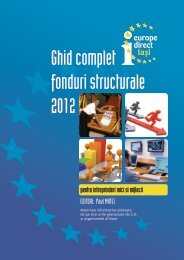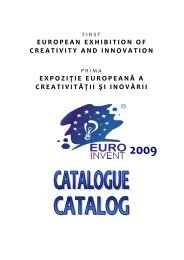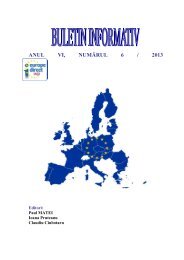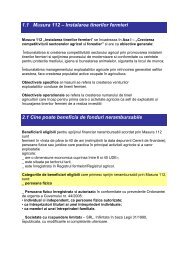Download - Europe Direct Iasi
Download - Europe Direct Iasi
Download - Europe Direct Iasi
You also want an ePaper? Increase the reach of your titles
YUMPU automatically turns print PDFs into web optimized ePapers that Google loves.
CLASS 4 EUROINVENT 2010 CLASA 4<br />
Descriere<br />
RO<br />
STEM cells of hair follicles. It is biocompatible and treats<br />
open wounds and burns.<br />
The powder has a high styptic, antiseptic, healing and<br />
regenerative capacity, because uses as support<br />
pharmaceutical fibrin mixed with sulphamide, lactose and<br />
calcium carbonate. After that coloidal silver (99.95% and<br />
10...80 nm particles size) is pulverized at a concentration of<br />
10 to 20 ppm.<br />
Invenţia se referă la o pudră funcţionalizată cu argint<br />
coloidal, pentru stimularea si proliferarea celulelor STEM a<br />
foliculilor pilosi. Aceasta este biocompatibila si tratează<br />
ranile deschise şi arsurile.<br />
Pudra are capacitate mare hemostatică, cicatrizantă şi<br />
regenerativă, deoarece este alcătuită din: fibrină amestecată<br />
cu sulfamidă, lactoză şi carbonat de calciu. După amestecul<br />
acestora argintul (99,95%, dimensiunea particulelor 10...80<br />
nm) este pulverizat într-o concentraţie de 10...20 ppm.<br />
4.26.<br />
Title EN<br />
Thermo-sensitive polymers with potential applications in<br />
drug delivery systems<br />
Titlu RO<br />
Polimeri termo-senzitivi cu aplicatii in distributia<br />
medicamentelor<br />
Authors A. Rusu, I. Rotaru, I. Nor, C. Ibanescu, N. Hurduc<br />
Institution „Gheorghe Asachi” Technical University of <strong>Iasi</strong><br />
Patent no. Pending<br />
The possibility to obtain different amphiphilic polymers with<br />
potential applications as drug delivery systems is presented. The<br />
polymers were synthesized by living radical polymerization<br />
using a polysiloxane macroinitiator containing cloro-benzil<br />
groups in the macromolecular side chain. Poly (dimethyl<br />
acrylic amides) sequences are able to react in the presence of<br />
thermal stimuli. Thus, depending on the existing conditions in<br />
Description the external environment, these sequences may adopt a linear or<br />
EN entangled conformation. If we associate these conformations<br />
with micelles structures, this could lead to an<br />
aggregation/disaggregation phenomenon, under thermal<br />
stimulation. Polymers were characterized by 1H-NMR<br />
spectroscopy, thermal gravimetric analysis and differential<br />
scanning calorimetry. The conformational changes were<br />
revealed by rheological tests studying the variation of loss and<br />
storage moduli versus temperature.<br />
73
















